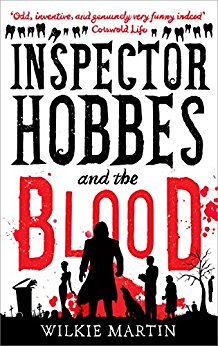Cotswold Conspiracies

Just before Christmas my significant other treated me to a surprise trip to the Cotswolds (thanks for that by the way), while this was very nice and I had a lovely time, it may seem a little unrelated to the subject of this website. Fear not though, a tenuous link is on its way. Whilst in the Cotswolds we dined in a pub, The Bell in Moreton on Marsh, that claims to have been the inspiration behind Tolkien’s Prancing Pony (it has a blue plaque and everything), in turn this inspired me to commit my Tolkien Tuppence worth to the hard drive, expect that shortly. For now though I’ll segue into another Cotswold link, this little trip prompted me to pick up the first book in a Cotswold set urban fantasy series, I know, just what we’ve all been waiting for right?
Inspector Hobbes and the Blood is another one of those books that’s been languishing in my kindle storage for some time now, I’ve been passing it over in favour of more recognisable works. I like an underdog though, and as per a previous blog entry, I want to review the stuff you might not have heard of elsewhere, what’s the point of me telling you about all the books everyone is already telling you to read?
Inspector Hobbes and the Blood is the first book in Wilkie Martin’s Unhuman series, set in the fictitious Cotswold town of Sorenchester (loosely modelled on Cirencester), and following the misadventures of its narrator, Andy Caplet. We soon discover that Andy is a rather poor excuse for a local journalist, something of a slob, and a man with a strong aversion to physical exertion. The real story begins when Andy is sent by his exasperated editor to write a ‘week in the life’ type piece on the local Police Inspector, the titular Hobbes. Hobbes is a larger than life, formidable force of nature, who takes Andy under his sizeable wing. As the duo become embroiled in a murder investigation, Andy’s eyes are opened to some of the more unusual inhabitants and activities occurring in Sorenchester, he also becomes increasingly aware of the peculiarities of Hobbes himself and his retinue of friends and contacts.
Shortly after starting this book I wondered if I would be able to make it to the end, I was a little overwhelmed by just how much the author had to say, where one word would do, ten were used. The best example of this I can give relates to the cooking of Hobbes housekeeper (very Sherlock Holmes, as is the use of Andy as narrator), she’s a feeder and Andy is appreciative to the point that I think every superlative in the dictionary might have been used to describe the meals she produces throughout the book. We get it, she can cook, move on already. This trend of labouring points repeats in other areas of the book, perhaps not quite so obviously, but it also has the effect of seeming to slow down the story. Another factor adding to that effect is the humour, the Unhuman series is marketed as a lighter take on the fantasy genre so this wasn’t a surprise, however, the jokes felt laboured, a bit like the superlatives it seemed that the author was trying too hard.
Somewhere around the halfway point, I was teetering towards putting the book down and picking something else up, then I laughed. A proper outside laugh as well rather than an inner chuckle, I’m not even certain that it was an intended joke, or just a hapless Andy Caplet moment. Coincidentally at around the same point the pace of the book seemed to lift, some of the more disparate strands of the story began to coalesce into something more tangible, and deeper mysteries were tantalisingly becoming apparent. From this point on my early cynicism began to wane and I found myself warming to the characters, particularly Hobbes, who is actually quite a creation, there’s a much bigger back story here which is hinted at but not revealed.
Towards the end of the book it felt as though the author had relaxed and settled into his own skin a little, I’m really hoping that the sequels to this book continue that trend. As it is, I would class this as a decent first effort, it sets the scene nicely for future books in the series. If the author can continue in the same vein as the second half of this book, then I may well have found a worthy new diversion to some of the more serious offerings out there.